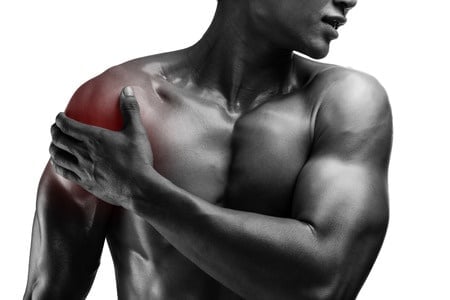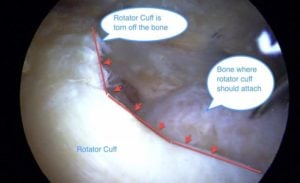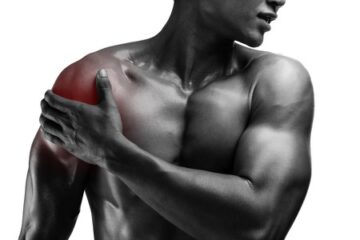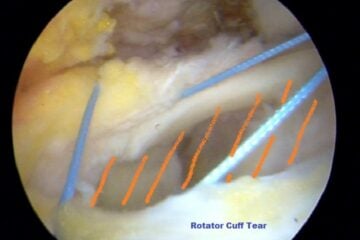
Massive rotator cuff tears cause significant pain and disability. Patients with massive rotator cuff tears will notice pain, weakness and loss of motion. Once you have torn a significant portion of your rotator cuff the shoulder will not function properly. Not only will you develop weakness and pain but the pain at night can become unbearable.
What can be done to treat your shoulder to minimize the pain due to massive rotator cuff tears?
The rotator cuff are a series of 4 muscles around the shoulder. They are beneath the larger deltoid muscle. The rotator cuff coordinates the motion and play a critical role in maintaining function of the shoulder. If the rotator cuff is torn, depending on the size of the tear, you may notice a loss of strength and significant pain with use and at rest.
What is a massive rotator cuff tear?

Massive rotator cuff tears can occur due to a traumatic injury or fall. Massive tears can also occur slowly over time due to degeneration or aging and wear of the rotator cuff. The cause of the tear will usually guide your treatment plan or options available.
Surgery is usually recommended to treat massive tears following an injury such as a severe fall. However, if you have a massive tear that occurred slowly over time and your tear is “retracted” and the muscle has significant “atrophy” then surgery might not be your best initial treatment option. In those situations where the muscle is atrophied (smaller) and retracted (pulled far away from its normal attachment to the bone) we will usually recommend physical therapy as the initial treatment option.
If physical therapy is unsuccessful at managing the pain and disability brought on by a massive rotator cuff tear then surgery becomes an option. Often times with these massive rotator cuff tears which are old, long standing, atrophied and retracted a repair might not be possible. In those situations we need to have other options available to improve the likelihood of achieving reasonable pain relief and return of function.
What if My First Rotator Cuff Repair Didn’t Heal?
The failure rate following treatment of a massive rotator cuff tear can be rather high. To a large degree that depends on how old the tear was and it also depends on the quality of your tendons at the time of repair. Poor tissue and bone quality typically leads to poor results from a rotator cuff repair.
In a situation where your first surgery failed, an attempt to repair the tendon a second time will almost certainly fail again. This is another situation where we consider alternative proceudres to attempt to improve the chance of success and improve the chance that your pain and function will improve.
What is a Superior Capsular Reconstruction?
A superior capsular reconstruction is a procedure where we place a graft (cadaver tissue) between the two bones of the shoulder in order to stabilize the shoulder and enable the remaining intact muscles to function better. By improving their function, you should notice an improvement in your pain and your function. The early results of this procedure appear to be promising. Time will ultimately tell if this is a good answer to the very complex problem that is a massive rotator cuff tear.
Below is a video of a superior capsular reconstruction from Arthrex. No.. :-) I do not work for them.
Do you have questions regarding an Orthopedic injury or longevity?
Do you want to talk to an expert who can listen to you for 45-60 minutes and explain the options in detail?
Dr. Howard Luks offers remote guidance sessions to review your X-ray or MRI images and explain your options.
Dr. Luks has also received hundreds of requests for educational sessions on the topics discussed in his book, Longevity Simplified.













Debra Barton
I had a massive rotator cuff tear that failed. The dr put 10 anchors in and sent me to therapy 5 days after surgery. My surgery was in May and I still can’t raise my arm up over my head. I have pain every time I use my arm and is pulling on muscles in my neck. Looking to get some relief. I’m still doing therapy exercises at home.
Hi Debra…
Sometimes these massive tears do fail. PT for stretching is usually well-tolerated early after surgery. Strengthening exercises are not. At this point, you may want to chat with a shoulder doc about your options. Shoulder specialists have other procedures that they might be able to offer you based on the location of the tear. We can transfer some muscles to make up for certain tears, and in some shoulders, we consider a procedure called a superior capsule reconstruction. The decision making about which procedure to do is very complex, so it will help if you can find someone who specializes in the shoulder.
Bob
I also had a very positive experience with this type of surgery following a massive left shoulder rotator cuff tear. In my case (2) tendons were beyond repair and a third was torn. If I understood the surgeon correctly a bicep tendon also needed reattachment to the bone. I had virtually minimal pain after damaging my shoulder and minimal pain after surgery.
It is probable that one reason I had limited pain was my use of ice on my shoulder immediately following surgery. I invested in a Don Joy ice machine used for therapy following surgery to keep the inflamtion down. Online I found a site that sold it for $185.00 I have heard from other knee, shoulder, and elbow patients that a number of health insurance companies will provide it for their patients.
For (9) weeks my arm was in a sling with the only times the sling was removed was to shower or after a number of weeks letting my arm hang down while I bent over at the waist. On my (10th) week I began physical therapy with easy stretching exercises avoiding any pain. Finally about a month after that I started doing strength exercises using different colored elastic bands. My stretching has become more aggressive once I started the strength training.
It is now 4 and 1/2 months following surgery I am still in physical therapy. Under doctor orders I can carry very light items in my left arm and I am still doing strength exercises and stretching at home aa well as in physical therapy. My first month after removing the sling and brace the most I could carry was a 8 ounce cup of coffee.
Walking is my main workout these days and I walk an average of 160 miles per month. My pain level was always fairly low and I was actually was able to walk daily following surgery.
My physical therapist is confident I will gain back about 80% of my strength in my left shoulder I really don’t know if in the future I will ever be able to resume lifting weights again or even play golf which prior to my surgery were almost daily activities for me. I will deal with whatever limitations arise following my surgery and move on to different activities that don’t negatively affect my shoulder.
again
Mark White
I too had a massive tear in my right shoulder. The repair required 7 anchors in total. My surgeon told me i completely tore 3 out of the 4 tendons. Today i’m at 1 yr post surgery . It has been a long up hill climb. I am 61 yrs old and have worked out all my life. I am just now hitting the gym 2 times per week now and lifting light weights with controlled movements at 25 reps per. Hang tough man, stretch and have patience it will eventually get better !
Bob
I recently had this surgery I was virtually pain free following the procedure and I am at day 20 following surgery. I will come back to this site in one more week as I start doing minimal exercises with my shoulder sling/brace temporarily removed.
Lynne Male
I’ve read thru all ur info, altho i only have a small tear in my rotator cuff and am opting for the PRP injection. I would like to thank you so much for the time and effort you’ve dedicated to educate the millions of us who suffer from pain caused by tendon problems. Your writings were so informative and my understanding is much more clear. Thank you again. ☺
:-)